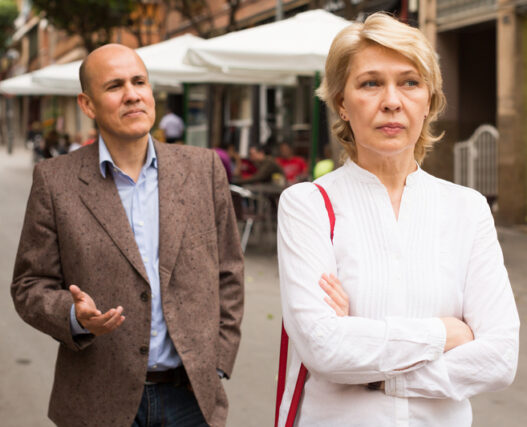If you’re the go-to person for everyone around you, setting boundaries can feel nearly impossible.

You’re the one who handles it, fixes it, listens to it, and probably feels guilty even thinking about saying no. The problem is that constantly being available to everyone else leaves very little space for you. The truth is, setting boundaries doesn’t make you less dependable. It makes you sustainable. Here’s how to protect your peace without abandoning your role as the “reliable one.”
1. Start by admitting it’s okay to be tired.

Being the strong one doesn’t mean you have unlimited emotional or physical capacity. Just because people lean on you doesn’t mean you don’t need rest, too. It’s not a weakness to feel drained; it’s a sign you’ve been giving more than you’ve been replenishing. Start by letting yourself admit it: “I’m tired. I need a break.” That internal change is the first step toward setting boundaries that don’t just serve other people—but serve you, too.
2. Learn to say no without explaining your whole life story.

You don’t need a detailed justification to protect your time. A simple, “I can’t take that on right now” is enough. Over-explaining often makes you sound unsure, even when your boundary is valid. The more you practise short, clear “no” statements, the more confident they’ll feel. You’ll be surprised how quickly other people adjust when you stop cushioning every refusal with guilt.
3. Don’t answer right away if you feel pressured.

If your default response is to say yes before you’ve even processed the ask, try giving yourself space first. A quick “Let me get back to you” buys you time to check in with yourself before you commit. That tiny buffer makes a big difference. It gives you a chance to respond thoughtfully instead of reactively, and that’s how you start breaking the pattern of automatic over-giving.
4. Use “I” language to own your needs without blaming.

It’s easier to set boundaries when you speak from your own experience. Try phrases like “I need some quiet time after work” or “I don’t have the capacity for that today.” It’s direct, but not defensive. People are more likely to respect your boundaries when they understand they come from self-awareness, not resentment. It also helps you feel clearer and more empowered about where you stand.
5. Block out time that’s just for you, and treat it like an appointment.

If your calendar’s always full of everyone else’s priorities, your own rest and recharge time will keep slipping to the bottom. Treat your alone time, rest time, or joy time with the same respect as a work call or a favour for a friend. When you honour your own time, it sends a message to yourself (and other people) that you matter, too. The more consistently you do this, the less guilt you’ll feel about protecting your peace.
6. Expect some pushback, and let it be uncomfortable.

If you’re the one who always says yes, people will notice when you start saying no. Some might get frustrated, confused, or try to push your limits. That doesn’t mean your boundary is wrong. Discomfort isn’t a red flag; it’s part of the process. Let it feel awkward if it has to. That discomfort is how people learn the new version of what you will—and won’t—offer.
7. Stop jumping in before people actually ask.

Sometimes the pressure to be the reliable one doesn’t come from other people—it comes from you. If you catch yourself offering help before it’s requested, pause. Let people ask. It’s not your job to anticipate and prevent every inconvenience in someone else’s life. Give other people the opportunity to solve things themselves. Your worth isn’t in how quickly you fix things.
8. Let people feel disappointed—it’s not your job to fix that.

Saying no might make someone feel let down. That’s okay. It doesn’t mean you’ve failed them. It just means they’re not getting what they wanted, and that’s a normal human emotion, not your emergency to solve. Letting people sit with their own feelings helps them grow, too. And it teaches your nervous system that you’re allowed to prioritise yourself without always managing everyone else’s reactions.
9. Don’t confuse being needed with being valued.

It’s easy to tie your identity to being the reliable one. However, when your worth is based on how useful you are, it becomes hard to rest, say no, or even ask for support yourself. Start separating the two. Being loved, respected, and valued shouldn’t come with conditions. You’re worthy whether or not you say yes today.
10. Practise setting boundaries in low-stakes situations.

If saying no to big asks feels too overwhelming, start small. Turn down a favour that’s not urgent. Say you’re unavailable for a phone call tonight. These little moments build your confidence. Once you see that the world doesn’t end when you say no, it gets easier to trust yourself with the bigger boundaries. Like anything else, it’s a muscle, and it gets stronger with use.
11. Remind yourself that burnout doesn’t make you more generous.

Being drained doesn’t make you more noble—it just makes you more resentful, more reactive, and more disconnected from the people you’re trying to help. You don’t have to hit a breaking point to justify rest. Healthy boundaries actually make you more available in the long run because they let you show up with presence, not exhaustion. That’s real support. Not self-sacrifice, but sustainability.
12. Let go of guilt by remembering what you’re protecting.

Saying no feels easier when you know what you’re saying yes to. Boundaries aren’t just about creating distance—they’re about creating room. Room for rest. Room for your own goals. Room for peace. Each time you protect your time or energy, you’re reinforcing the message that your life is worth tending to. That’s not selfish; that’s self-respect in action.
13. Remind yourself: reliability doesn’t mean being everyone’s solution.

You can still be kind, dependable, and helpful without being the one who does everything. Reliability isn’t about never letting anyone down—it’s about showing up in ways that don’t break you in the process. When you start setting boundaries from this mindset, it becomes less about saying “no” and more about saying “yes” to being a whole, supported person—not just someone holding everything together.




